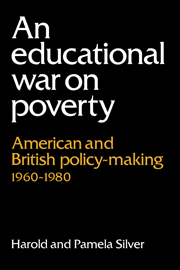Book contents
- Frontmatter
- Contents
- Acknowledgments
- List of abbreviations
- 1 Introduction: a proper complexity
- Part I A pattern of events: United States
- 2 Poverty and education: changing concerns and concepts
- 3 Education: children and intervention
- 4 Learning their way out of poverty?
- 5 Education and the prime target
- 6 An effort to understand
- Part II A pattern of events: Britain
- Part III Following through
- Interviews and consultation
- Bibliography
- Index
4 - Learning their way out of poverty?
Published online by Cambridge University Press: 03 October 2009
- Frontmatter
- Contents
- Acknowledgments
- List of abbreviations
- 1 Introduction: a proper complexity
- Part I A pattern of events: United States
- 2 Poverty and education: changing concerns and concepts
- 3 Education: children and intervention
- 4 Learning their way out of poverty?
- 5 Education and the prime target
- 6 An effort to understand
- Part II A pattern of events: Britain
- Part III Following through
- Interviews and consultation
- Bibliography
- Index
Summary
President Johnson is reported to have described the educational programme of his War on Poverty, at a planning meeting, in the following terms:
This is going to be an education program. We are going to eliminate poverty with education… This is not going to be a handout, this is going to be something where people are going to learn their way out of poverty.
(A: Ashline et al. 1976, xvii)Accurate or not, the reported comment encapsulates the mood that Johnson inherited and to which he gave his authority. In his Message on Poverty to Congress on 16 March 1964 he announced the goal. There were immense opportunities, there was unfinished work to be accomplished: ‘To finish that work I have called for a national war on poverty. Our objective: total victory’ (A: Ferman, 1965, 426). In his Message on Education to Congress the following year, Johnson announced the forthcoming education bill as having ‘a national goal of full educational opportunity’, targeted particularly at the children of low-income families: ‘poverty has many roots but the taproot is ignorance’. He told America again in January 1965: ‘we must start where men who would improve their society have always known they must begin-with an educational system restudied, reinforced, and revitalized’ (A: US Congress, House, Committee on Education and Labor, 1965, 2-10). The aims and means for conducting the war were quickly adopted and made explicit by Johnson and his administration. His Vice-President, Hubert Humphrey, summarized the theme in 1964, with metaphors and concepts embodying assumptions that now had common currency in policy-making circles:
- Type
- Chapter
- Information
- An Educational War on PovertyAmerican and British Policy-making 1960–1980, pp. 70 - 92Publisher: Cambridge University PressPrint publication year: 1991



